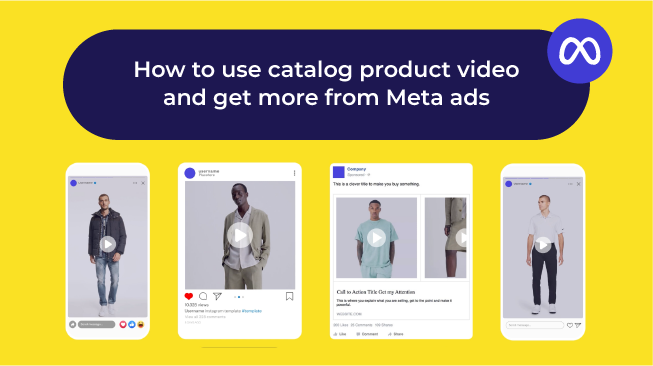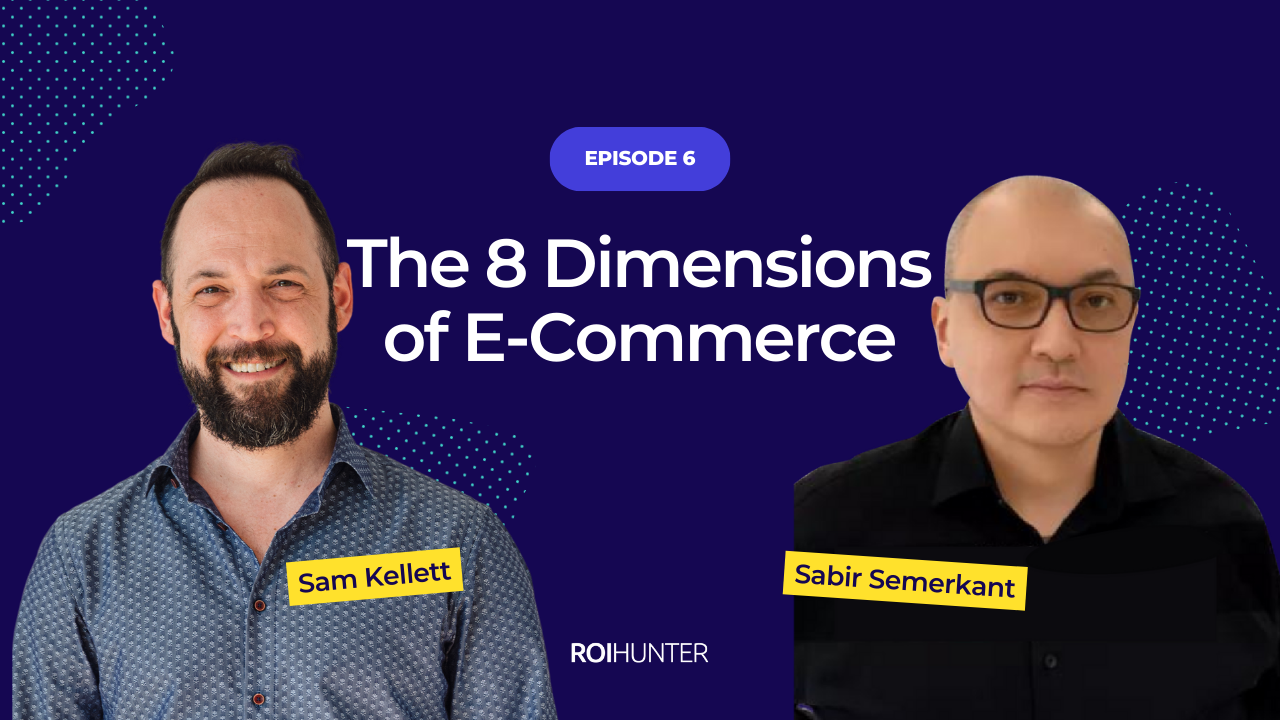You can find episodes of the E-Commerce Speaks in whatever format you like best, ranging from video, to audio, to the transcript below.
SPOTIFY EPISODE:
AUDIO
VIDEO
Profitability vs Growth - Short Summary
In the first episode of E-Commerce Speaks, we talk with Karel Schindler, Founder & CEO of ROI Hunter, about when e-commerce companies should focus on profitability and when they should focus on growth.
We also talk about how e-commerce retailers can work to adapt to a new mindset, as well as how they can improve the efficiency of their campaigns regardless of if they are profitability-minded or growth-minded.
Transcript of the episode
SAM
Karel, thank you so much for joining us today for this first episode of the podcast. Really great to have you here with us.
KAREL
Thanks for having me. Looking forward to this.
SAM
So to begin, can you tell me a little bit about yourself, your position and about your company?
KAREL
Well, we started the business many years ago. I think it's nine years already where we started originally as a Facebook business partner. At the time, it was a different name, but we were kind of opportunistic. We were serving many verticals and we were correcting a lot of issues, but it wasn't good for the business.
So the business went down and we had to make difficult changes. In 2019 when we actually turned around the business. That's where I started at the HBS. And I realized and got fascinated with how retailing works. And I realized that we have data that can make retailing way more efficient. And that's where we pivoted to the whole business and the whole product to essentially utilize the data to make retailers more efficient.
And yeah, that's where we started. I would say new chapter of ROI Hunter and I feel honored that it seems to be working because we are serving the best brands in the world. So that's how I got to e-commerce slash retailing.
SAM
Okay. What, what interested you in e-commerce in the first place? Like what made you decide that this was where your passion was?
KAREL
Well, I like that retailing is a game of efficiency, so you can think of it in a broader picture that if you really utilize the data, you can be really more efficient. And at the same time is the biggest and the oldest industry in the world. So for me, it's fascinating how big an impact we could create if we inspired this industry to work with the data differently.
So that's what I felt first time in my life that we could really have a meaningful purpose as a company. And it was really energizing for me. And that gives me energy on a daily basis because running a business, it is actually getting slaps from multiple sides every day. But since I believe that our purpose is very strong, it's what drives me forward.
SAM
Just for my own curiosity, since you have a company supporting e-commerce retail, let's say you didn't have that. If you were opening your own e-commerce company, what do you think you would sell? What would you be doing?
KAREL
Well, I would actually buy a company because I see that there are a lot of very good niche, vertically integrated companies that are actually creating really good product for a certain audience, but they try to scale and the unit economy fell apart and they they can't make the unit economy work.
So they are usually going out of the business and sometimes selling the business for very cheap price. And I believe that these companies are exactly what I would buy and then fix the unit economy with product performance and management concept that we are developing and sell it when it's able to scale again.
SAM
One thing I wanted to talk to you about, because you and I have had some conversations before this about why profitability is so important right now for e-commerce. And obviously profitability has always been a factor. It's always going to be something important. But I wanted to ask you why you think right now specifically is such a pivotal time for profitability?
KAREL
Yeah. So I think that it's important to basically get back into what profitability means. If you are not profitable, that means that you are burning good money, but you need to somehow get to the money. So you usually you landed the money somehow or borrowed the money. And that's pretty much where the cost of capital what is the interest rate is very important because that is pretty much dictate how much you're going to pay for the money that you need to basically subsidize to grow.
And this is where right now we see the historical heights of interest rate, where in UK US it's 5% in emerging markets like Brazil, it's even 13%. So that's a lot of money. That is the base for the banks. So usually you can get the money even for multiple of this price.And this is pretty much why the interest rate and cost of capital is influencing so much when you should be profitable versus the way to cut when the capital is cheap and you can invest in a growth.
SAM
Okay. So when interest rates are are high, you need to be profitable because they're not going to give you enough money to keep yourself going if you're not profitable. And when they're low, that's when you can focus more on just growing as a business?
KAREL
Yeah, it's very simplified, but you can use it as a rule of thumb.
SAM
Simplified is perfect for me on that (laughs). That's what I'm going to go for. Okay, so now if we're switching then into into more of a profitability sustainability mindset away from the growth mindset, how should retailers try to adapt to that if they've been in this same growth mindset that we've had for the past decade or two?
What are some of the steps they should be taking now in order to survive in the new world?
KAREL
Yeah, I think that the most important element of retaining is efficiency. So how can they remove inefficiencies? And usually what we see is that you can tweak a bit departments to be more, more efficient. But the biggest inefficiencies are actually between departments.
So if I give you an example, let's say marketing is trying to fine tune their marketing activities to get better ROAS, but maybe they are selling products that are actually meaning for the business, that the business has a very low margin.
So when you add to on top of this very low margin the real costs of advertising, then you are essentially losing the money. And the more money you spend in marketing, the more you are essentially losing.
And on the flip side, you might have the commercial team that is trying to find, okay, so what products they should essentially price differently and they might be decreasing the price of certain products that weren’t even promoted. And this friction’s where marketing is promoting suboptimal products and merchandizing or commercial teams are discounting products that weren’t essentially even promoted.
That's because these teams are not communicating to each other and not that they wouldn't like to. They have their meetings, etc. but it's difficult for them to connect the dots in terms of the data so that they could have mutual visibility of what to do.
So there's a bit of a breakdown in communication. There's a disconnect between the different departments in a company.
SAM
Let's say I'm a retailer then. Say I'm mid-market. What would be my first step
then to start connecting those departments to get that data working in tandem? Say, say I'm starting from ground zero. I just have my department's knowledge. What should my next step be?
KAREL
Well, I would try to really understand what is the marketing effort behind every single SKU. I would try to get this information to commercial teams and then I would get information from commercial teams in terms of what is the margin or return rates or business critical parameters of product.
This is the data point that I would give to marketing so that they at least can see
maybe they can’t directly optimize towards it. It's more difficult. They would need sophisticated tools, but at least they can kind of understand the other party. And this is what I would start with.
SAM
Okay. So I'm a retailer, I sell some clothing. What I can do is I can go to my marketing department and say, all right, tell me what you're spending for these different SKUs. Let's put it in a spreadsheet. Then I'll go over and I'll have them meet with my merchandizing department. They can put in the different margins they have for that and they can share those over, do some regular meetings. And it won't be perfect, but it's a good way to start and make sure that you're accounting for everything?
KAREL
Yeah. And then you have at least some data to have meaningful conversations about, because I've been part to many meetings where essentially marketing was blaming that commercial teams are buying crappy products and commercial teams are they're accusing marketing to do some odd work that doesn't work. So I think that you can at least put the layer of data to these conversations.
SAM
So start adding the data and then you can be like, No, it doesn't work. And I can prove to you why. Here's the data right here. So get that product out of here.
KAREL
But it's not about proving the other party did it all wrong.
SAM
Sure. Okay.
KAREL
Maybe we can focus our energy on certain segment of products. Or maybe we can change the strategy. And instead of discounting these products, we should rather double down on promotion. And we can find these biggest inefficiencies way easier.
SAM
Okay, So it's not winning. It's working together, bringing the departments together.
Now I know ROI Hunter has worked with a great number of different e-commerce retailers over the years. Other than this collaborative energy, are there any factors that you say that really separate some of the most successful ecommerce out there from the rest of them?
KAREL
Yeah, it's not about just these two departments. It's about the approach to data. If you look at the most successful retailers like Shein or Zara, these are basically tech companies that happen to sell clothes. They are really collecting data and processing data. This is their bread and butter. So the biggest question is how you can really utilize the data.
And that's where we see the biggest challenges because currently a lot of retailers have plenty of data sitting in different silos. So the art is to connect these silos and make it actionable.
SAM
Okay, so the big ones aren't just the ones that are taking all of this data in, they're the ones that can take that data in and actually use it and action it and make things happen from this data.
KAREL
Yeah. And make sure that everyone who needs the data can access that data.
SAM
Okay, great. Well, the last thing that I really wanted to ask you is just more of an open ended, general question. As someone who has, again been working with all of these different e-commerce companies for quite a long time, what advice do you have for e-commerce retailers that have been focused on growth?
We're talking about now it's over to profitability. Now, I know we mentioned getting collaboration going between your marketing and your merchandizing department, your commercial departments to begin with. But is there any other advice that you might offer to retailers?
KAREL
Yeah. So if the retailer is focused on growth, then certainly they have some good reasons for that. Maybe they've accumulated the cash and they don't want inflation to actually destroy the value of the cash. So for them it's better to simply invest the cash in the growth.
So not every retailer is in a position where profitability is necessarily a bad thing because they need to essentially borrow the cash. So there are certain reasons for certain strategies. But even when your strategy is growth, I would look at how this growth is compounded.
What is behind this growth? Because maybe 90% of this growth is actually healthy and even slightly profitable. But then you have 10% of revenue that is created by overpromoted products that are just consuming 20% of marketing costs. And this is, by the way, what we see very often when we start working with any clients that usually 20% of their costs are wasted in this sense. So then you can think of, okay, what if they move this 20% of costs to better products?
SAM
Yeah.
KAREL
And this is the question I would ask, because that can be significant variable costs and you can do this analysis not only in the marketing department, you can do a similar analysis in your commercial teams and you can even think of, okay, what are the synergies where we could find these inefficiencies.
So I would say that fighting inefficiencies is not just for e-commerce companies that need profitability, but also for companies that want to further accelerate their growth.
SAM
Okay. So fighting inefficiencies and moving that inefficient funding to somewhere where it can really, really make it worth it.
KAREL
Yeah.
SAM
Well, Karel, that's all I wanted to go through today. Again, thank you so much for taking the time to join us. And it was a pleasure having you here.
KAREL
Thank you. It was fun. Thanks.


.png)
